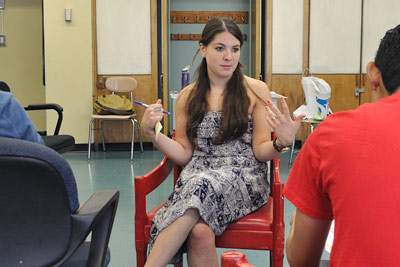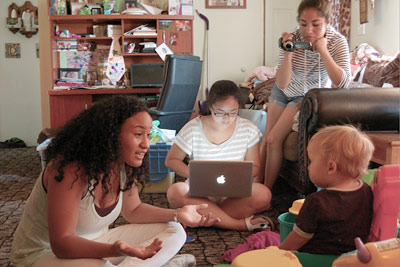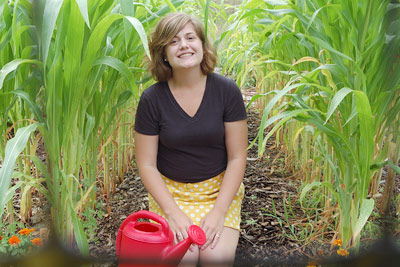Students spend summer doing research, outreach
By Sam Wolken



This past summer, 21 Cornell students tackled such problems as invasive stink bugs, lack of sexual education in inner-city neighborhoods and weeds on school grounds, working with faculty members and gaining research experience while touching the lives of New Yorkers through the Cornell Cooperative Extension (CCE) Summer Internship Program.
On Sept. 24, faculty, staff and community members gathered in Statler Hall to celebrate the accomplishments of the interns, each of whom presented a three-panel poster summarizing his or her research and discussed the internship experience.
Alexandra Gensemer '13 joined Nancy Wells, associate professor of design and environmental analysis, to explore a ground-up approach to school nutrition called Healthy Gardens, Healthy Youth. In collaboration with three other universities, participants in the project planted more than 50 gardens in schools in Arkansas, Iowa, New York and Washington. The program provides nutritious food to elementary school students while educating them about health and gardening. Gensemer collected and analyzed data on the energy and well-being of the children and assisted with planting gardens.
Susan Weibman '13 spent her second consecutive summer studying the marmorated stink bug in New York with Peter Jentsch, senior extension associate. Weibman explained that the stink bug, an agricultural pest, first entered the United States in 1998 aboard a Chinese cargo ship and has spread rapidly since. Weibman measured populations of stink bugs near orchards in Ulster County. Her results showed a dramatic increase in the New York stink bug population over the past year. She also researched natural methods of curbing the stink bug population.
To research the exercise habits and cultural identity of immigrant children in rural areas, Roxana Orellana '13 spent her summer in Wayne County. She worked with children between the ages of 10 and 14 on a project led by senior lecturer Pilar Parra called Healthy Bodies and Healthy Minds: Cultivating Identity With Immigrant Children.Through the project, children were taught about exercise, nutrition and programs available to them for staying active.Orellana focused on fostering a sense of belonging and pride in the community among the children.
Many students concluded that the most rewarding aspect of the summer was connecting with the people whose lives their work affected. Julie Avrutine '13 taught a sexual health curriculum in New York City and remarked, "The best part was that I thought that I knew everything about the program, but in reality when you go into different neighborhoods and you see all different phases of adolescence and what they can teach you, it really is phenomenal."
For some of the interns, the experience didn't end with the beginning of the new school year. Orellana, as well as others, will rejoin her project working full time following graduation.
CCE has offered internships combining research and community involvement since 2007. CCE partners with faculty and staff from the College of Agriculture and Life Sciences, the College of Human Ecology and the ILR School to apply Cornell's resources to state and national needs.
Sam Wolken '14 is a student intern for the Cornell Chronicle.
Media Contact
Get Cornell news delivered right to your inbox.
Subscribe